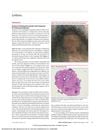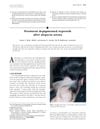Different types of sun exposure can damage skin cells and affect healing, with chronic exposure being more harmful, and certain immune cells help in the repair process.
 February 2016 in “The journal of investigative dermatology/Journal of investigative dermatology”
February 2016 in “The journal of investigative dermatology/Journal of investigative dermatology” JAK inhibitors may help treat alopecia areata by reversing hair loss.
 1 citations,
November 1996 in “Journal of Cutaneous Medicine and Surgery”
1 citations,
November 1996 in “Journal of Cutaneous Medicine and Surgery” Hormones, especially androgens, play a key role in causing acne, and treatments like hormone control pills and hormone-blocking medications can help.
[object Object]  35 citations,
January 2006 in “Journal of Dermatological Treatment”
35 citations,
January 2006 in “Journal of Dermatological Treatment” Zinc can help with some skin problems, but its effectiveness varies depending on the condition.

Lower LDL-c levels predict higher COVID-19 mortality.
 4 citations,
November 2014
4 citations,
November 2014 The skin protects the body, regulates temperature, senses touch, and makes vitamin D.
49 citations,
July 1994 in “British journal of dermatology/British journal of dermatology, Supplement” Some children with methylmalonic and propionic acidaemias have skin problems related to their condition and diet.
 17 citations,
August 2019 in “JAMA Facial Plastic Surgery”
17 citations,
August 2019 in “JAMA Facial Plastic Surgery” Some men lost hair after deoxycholic acid treatment for neck fat, but most saw improvement or resolution.
3 citations,
January 2012 in “Journal of cosmetics, dermatological sciences and applications” Many Iraqi patients had skin problems at the site where a vein was taken for heart surgery.
 32 citations,
April 2014 in “The journal of investigative dermatology/Journal of investigative dermatology”
32 citations,
April 2014 in “The journal of investigative dermatology/Journal of investigative dermatology” Loss of keratin K2 causes skin problems and inflammation.
 23 citations,
April 2002 in “Journal of the American Academy of Dermatology”
23 citations,
April 2002 in “Journal of the American Academy of Dermatology” Depigmented hair regrowth after alopecia areata can be permanent.
 19 citations,
June 2018 in “Breast Cancer Research and Treatment”
19 citations,
June 2018 in “Breast Cancer Research and Treatment” Scalp cooling effectively prevents severe hair loss in breast cancer patients treated with docetaxel and is safe.
 138 citations,
July 2015 in “Clinical, Cosmetic and Investigational Dermatology”
138 citations,
July 2015 in “Clinical, Cosmetic and Investigational Dermatology” Eating less sugar, milk, and saturated fats and more vegetables and fish may help treat and prevent acne.
 68 citations,
May 2011 in “European Journal of Dermatology”
68 citations,
May 2011 in “European Journal of Dermatology” Acne is caused by genetics, diet, hormones, and bacteria, with treatments not yet curative.
 22 citations,
March 2017 in “Scientific reports”
22 citations,
March 2017 in “Scientific reports” Double-stranded RNA causes inflammation in hair follicle cells, which may help understand and treat alopecia areata.
 22 citations,
June 2013 in “Australasian Journal of Dermatology”
22 citations,
June 2013 in “Australasian Journal of Dermatology” Early stage bald spots are linked to skin inflammation and damage to the upper part of the hair follicle.
[object Object]  22 citations,
February 2013 in “Wound Repair and Regeneration”
22 citations,
February 2013 in “Wound Repair and Regeneration” Mice genetically modified to produce more CD109 in their skin had less inflammation and better healing with less scarring.
 14 citations,
August 2022 in “Lupus Science & Medicine”
14 citations,
August 2022 in “Lupus Science & Medicine” SLE patients experience two patterns of non-inflammatory symptoms: intermittent and persistent.
 14 citations,
October 2020 in “Journal of ethnopharmacology”
14 citations,
October 2020 in “Journal of ethnopharmacology” Lepidium sativum seed extracts helped reduce inflammation and improve insulin response in obese rats on a high-fat diet.
 January 2018 in “Springer eBooks”
January 2018 in “Springer eBooks” Hidradenitis Suppurativa is likely an autoinflammatory disease, and better understanding its causes could improve treatments.
 7 citations,
June 2020 in “Translational Andrology and Urology”
7 citations,
June 2020 in “Translational Andrology and Urology” Finasteride for hair loss may cause lasting sexual, genitourinary, mental, and anti-androgenic side effects in young men.
 7 citations,
January 2022 in “Evidence-based complementary and alternative medicine”
7 citations,
January 2022 in “Evidence-based complementary and alternative medicine” Ginger supplements helped reduce symptoms and improve metabolic health in hypothyroid patients.
 39 citations,
October 2015 in “Case Reports”
39 citations,
October 2015 in “Case Reports” Some people experience severe, long-lasting side effects from fluoroquinolone antibiotics, leading to the recommendation of limited use and increased awareness of these risks.
 14 citations,
February 2020 in “Stem Cells International”
14 citations,
February 2020 in “Stem Cells International” Umbilical cord cells safely improve healing in long-term nonhealing wounds better than a placebo.
 6 citations,
July 2015 in “Journal of Investigative Dermatology”
6 citations,
July 2015 in “Journal of Investigative Dermatology” Chicken feather gene mutation helps understand human hair disorders.

Icosapent ethyl may help treat long-lasting symptoms after COVID-19.
2 citations,
September 2022 in “Frontiers in Nutrition” High-dose vitamin D3 does not improve symptoms or quality of life in COVID-19 patients after one year.
 April 2016 in “Journal of Investigative Dermatology”
April 2016 in “Journal of Investigative Dermatology” A peptide known for reducing wrinkles also effectively inhibits an enzyme linked to skin inflammation and acne.
October 2022 in “Biomolecules” Allopregnanolone can reduce gut inflammation and normalize neurotransmitter levels after finasteride withdrawal.
 December 2022 in “Exploratory animal and medical research”
December 2022 in “Exploratory animal and medical research” The study concluded that Acral lick dermatitis is most common in young male Labrador retrievers, often caused by psychological factors, and leads to skin inflammation and stress-related blood changes.
























